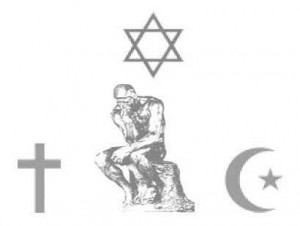 It is the duty of every cultured man or woman to read sympathetically the scriptures of the world. If we are to respect others’ religions as we would have them respect our own, a friendly study of the world’s religions is a sacred duty. – Mohandas K. Gandhi
It is the duty of every cultured man or woman to read sympathetically the scriptures of the world. If we are to respect others’ religions as we would have them respect our own, a friendly study of the world’s religions is a sacred duty. – Mohandas K. Gandhi
| I disapprove of what you say, but I will defend to the death your right to say it. – Voltaire | One thing I am ready to fight for as long as I can, in word and act — that is, that we shall be better, braver, and more active people if we believe it right to look for what we do not know. – Socrates |
A Work in Progress
One of my current projects is developing the idea for a “Socratic Sunday School”, briefly described below. More details to follow soon. Please feel free to contact me with questions and/or suggestions.
Overview
In the best tradition of liberal education — the teaching of the knowledge and skills required by free, self-actualized persons living in free, cosmopolitan civil societies — The Socratic Sunday School for Adults contributes to the welfare of individuals, communities and the world in general by facilitating the friendly, firsthand, evenhandedly comparative, secular study of the core texts (“scriptures”) of the Abrahamic traditions in English translation, within safe, generally multi-faith, adult environments.
Using standard scholarly techniques of historical contextualization and literary interpretation in professionally-led Socratic Method seminars, adult students of diverse ages and backgrounds acquire an understanding of the texts (individually and collectively) and the tradition(s) that produced them, as well as of the issues and controversies surrounding them. In addition, students develop their critical thinking and empathy skills and an awareness of the range of perspectives, assumptions and expectations that different traditions and individuals bring to particular texts — including the ones that they and “their” tradition bring. Students thus also develop comfort with and tolerance for a range of texts and traditions — as well as the experience and confidence of discussing these texts and traditions with a range of “Others” — necessary for a vibrant, cosmopolitan civil society that values lifelong learning.
You must be logged in to post a comment.